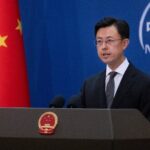Introduction
In a surprising turn of events, TikTok CEO Shou Zi Chew publicly thanked former President Donald Trump for his efforts in attempting to resolve the United States’ proposed ban on the app. The statement came during a pivotal moment when TikTok continues to face scrutiny over data privacy and its relationship with the Chinese government. This unexpected expression of gratitude highlights the complexities of international business, politics, and the ongoing debate about data security in the digital age.
Background: The US Ban on TikTok
Origins of the Ban
The controversy surrounding TikTok in the US began in 2020 when the Trump administration raised concerns about the app’s data practices. The administration alleged that TikTok’s parent company, ByteDance, posed a national security risk due to its potential to share user data with the Chinese government.
Citing these concerns, Trump issued executive orders aimed at banning the app or forcing ByteDance to sell its US operations to an American entity. The proposed ban sparked widespread debate, legal battles, and significant public backlash.
Legal Challenges and Delays
TikTok’s response to the ban included legal challenges that questioned the legitimacy of the executive orders. The app’s popularity among American users, particularly younger demographics, also created political and cultural resistance to the ban. These factors delayed the implementation of any concrete measures, leaving the issue unresolved when Trump left office.
Shou Zi Chew’s Statement
Acknowledging Trump’s Efforts
During a recent public forum, Shou Zi Chew addressed the ongoing scrutiny TikTok faces in the US. In a move that surprised many, Chew thanked Trump for his efforts to seek a resolution to the ban. He stated:
“While we may not have agreed on everything, I want to acknowledge the former president’s willingness to engage with us. His administration’s efforts to find a pathway forward showed the importance of dialogue in resolving such issues.”
A Diplomatic Approach
Chew’s comments reflect a diplomatic strategy aimed at rebuilding trust with US policymakers and the public. By acknowledging Trump’s role in initiating discussions, TikTok signals its willingness to cooperate and address concerns transparently.
TikTok’s Current Challenges in the US
Continued Scrutiny Under the Biden Administration
Although the Biden administration rescinded Trump’s executive orders, it introduced new measures to scrutinize apps with ties to foreign governments. The Committee on Foreign Investment in the United States (CFIUS) has continued to investigate TikTok, focusing on data security and potential national security risks.
Public Perception and Misinformation
TikTok’s popularity in the US remains a double-edged sword. While it boasts over 150 million users, concerns about data privacy and misinformation persist. These issues have fueled debates about the platform’s role in influencing public opinion and its potential misuse by foreign entities.
The Broader Implications
Tech Companies and Geopolitics
TikTok’s saga underscores the challenges faced by global tech companies operating in an increasingly polarized geopolitical environment. The app’s struggles highlight the need for robust governance frameworks to address concerns about data privacy and sovereignty.
Balancing Innovation and Security
The TikTok ban debate raises broader questions about balancing innovation with national security. As governments grapple with the implications of globalized technology, businesses must adapt to heightened scrutiny and evolving regulations.
Lessons for the Future
TikTok’s experience offers key takeaways for policymakers and tech companies:
- Transparency is Crucial: Open dialogue and clear communication can help build trust and address concerns.
- Proactive Regulation: Governments must develop proactive, consistent frameworks to regulate emerging technologies without stifling innovation.
- Collaboration Over Conflict: Cooperative approaches between businesses and governments are more effective than adversarial strategies.
Expanding on Key Themes
The Evolution of TikTok’s Popularity in the US
TikTok’s rise to prominence in the US market has been meteoric. From dance challenges to educational content, the platform has captured the attention of millions of users. However, this growth has also brought increased scrutiny. How did TikTok become such a cultural phenomenon? Its user-centric algorithm, creative tools, and community-driven environment have been key factors. Yet, these same aspects have drawn concerns about data collection and user privacy.
Global Influence and Cultural Impact
TikTok’s influence extends far beyond its user base. The platform has shaped music, fashion, and even political discourse. For example, viral trends on TikTok have propelled obscure songs to the top of music charts and have amplified social movements. This level of influence raises questions about the responsibility of platforms in shaping culture and public opinion.
The Geopolitical Tug-of-War
The TikTok ban debate is emblematic of the larger geopolitical tensions between the US and China. These tensions are not just about technology but also about economic dominance and national security. As TikTok navigates these challenges, it becomes a case study in how companies can operate across politically charged landscapes.
The Role of Public Opinion
Public opinion has played a significant role in TikTok’s US saga. When the Trump administration proposed the ban, users flooded social media with protests. This grassroots support demonstrated the power of community in shaping policy decisions. However, it also highlighted the need for tech companies to engage meaningfully with their user base.
Looking Ahead: TikTok’s Future Prospects
Strengthening Trust Through Transparency
One of TikTok’s key challenges is rebuilding trust with US regulators and the public. Initiatives like data transparency centers and partnerships with US-based companies could be instrumental. Additionally, fostering open dialogue about data privacy practices can help mitigate concerns.
Innovation Amidst Scrutiny
TikTok’s ability to innovate despite regulatory challenges will determine its future success. From enhancing its algorithm to launching new features, the platform must balance creativity with compliance.
Learning from Past Challenges
The lessons from TikTok’s US ban saga can serve as a roadmap for other global tech companies. By prioritizing transparency, compliance, and collaboration, businesses can navigate complex regulatory landscapes more effectively.
Conclusion
Shou Zi Chew’s acknowledgment of Donald Trump’s efforts marks a significant moment in TikTok’s ongoing journey in the US. It reflects the platform’s commitment to fostering dialogue and addressing concerns head-on. As debates about data privacy and security continue to shape the tech industry, TikTok’s story serves as a testament to the importance of adaptability, collaboration, and transparency in navigating the complex intersection of technology and geopolitics.
The future of TikTok in the US remains uncertain, but one thing is clear: the conversation it has sparked will influence the policies and practices of tech companies for years to come. Expanding trust, embracing innovation, and collaborating with global stakeholders will be critical for TikTok’s sustained success in an increasingly complex world.





